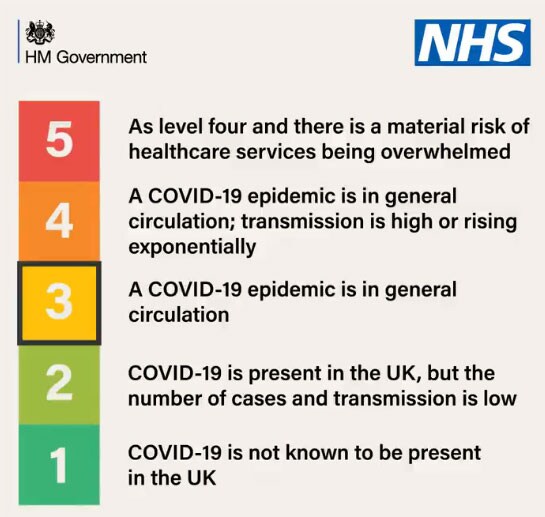These are the UK coronavirus stories you need to know about today.
'Perilous Turning Point'

Prime Minister Boris Johnson went to the Commons to announce new restrictions for England to help drive down rising infections and lower the R number. He's also recording a TV address that'll be shown at 8pm tonight.
Yesterday, his chief medical adviser Professor Chris Whitty said ministers would have to "walk a very difficult balance" with the benefits and risks of restrictions.
"This is the moment when we must act," Mr Johnson said, saying that like France and Spain, we've reached "a perilous turning point".
"First we are once again asking office workers who can work from home to do so." The message to go back to work was only issued a few weeks ago.
From Thursday, all pubs, bars, and restaurants can only operate a table service with a 10pm closing time.
Face covering rules are extended to taxi drivers, shop workers, and indoor hospitality users, except when eating.
Wedding ceremonies and receptions can now only include 15 people, funerals stay at 30.
"We will also have to extend the rule of six to all adult indoor team sports," he said, and: "We have to acknowledge that the spread of the virus is now affecting our ability to reopen business conferences, exhibitions, and large sporting events."
On shielding, "Following advice from our senior clinicians, our guidance continues to be that you do not need to shield, except in local lockdown areas, and we will keep this under constant review."
Schools, colleges, and universities will stay open.
He warned: "I must emphasise that if all our actions fail to bring the R below 1, then we reserve the right to deploy greater firepower with significantly greater restrictions."
These are not short-term restrictions he said: "Unless we palpably make progress we should assume that the restrictions I have announced will remain in place for perhaps 6 months."
Complacency, he said: "Could be our undoing."
Reacting to the new measures via the Science Media Centre, Linda Bauld, professor of public health, University of Edinburgh, said: "These new measures to be applied across England are not as stringent as might have been expected. Some of them are already in place in parts of the country with local restrictions."
Scotland's Harder Line
Scotland's First Minister Nicola Sturgeon told the Scottish Parliament virus levels are "rising faster than we can be comfortable with, and we cannot let it continue unchecked".
She added: "That's why action to bring it back under control is necessary."
A nationwide ban on most visiting of other households indoors will be introduced from tomorrow.
Hospitality measures similar to those announced for England will also apply in Scotland from Friday.
Anyone who can work from home will be encouraged to do so.
Car sharing is also being discouraged and people are asked not to book non-essential overseas travel for the October break.
Ms Sturgeon addressed rumours of 'circuit breaker' plans during half term: "The Scottish Government has not made any decision at this stage to implement such a policy however we are actively keeping it under review."
She said: "Inevitably, some will think they [the restrictions] go too far and others will think they don't go far enough but we have tried to get the balance as right as possible and to act urgently."
The measures will be reviewed every 3 weeks and the First Minister said she hoped they wouldn't be needed for a full 6 months.
Wales is also due to announce new measures. It already recommends home working where possible.
Yesterday Northern Ireland announced restrictions on most gatherings indoors with other households. These will apply from 6pm today.
There were 4926 new UK COVID-19 cases reported today.
Alert Level Raised
The UK's CMOs agreed to raise the COVID-19 alert level from 3 to 4 yesterday.
In a statement they said: "After a period of lower COVID cases and deaths, the number of cases are now rising rapidly and probably exponentially in significant parts of all four nations. If we are to avoid significant excess deaths and exceptional pressure in the NHS and other health services over the autumn and winter, everyone has to follow the social distancing guidance, wear face coverings correctly, and wash their hands regularly."

ONS Data
The latest Office for National Statistics (ONS) data for England and Wales show that the rates of deaths among male health and social care professionals were around three times higher when the virus was more likely to be acquired before lockdown than during lockdown. In women, rates were around two times higher.
In weekly ONS data, the number of deaths registered in the week to 11 September was 5.4% above the 5-year average.
The number of deaths involving COVID-19 increased across five of the nine English regions. However, COVID-19 accounted for just 1% of all deaths registered.
Letters to CMOs
A group of experts have written to the UK CMOs calling for a more targeted approach to COVID-19 interventions to focus on older people and those most at risk. Signatories include Professor Karol Sikora, Rutherford Health and University of Buckingham, who comments on cancer issues for Medscape UK.
A second open letter, published in The BMJ takes a different approach, arguing supporting "continuing efforts to suppress the virus across the entire population, rather than adopt a policy of segmentation or shielding the vulnerable until 'herd immunity' has developed”. Signatories include Trisha Greenhalgh, professor of primary care health sciences, Nuffield Department of Primary Care Health Sciences, University of Oxford.
Cold Homes & COVID-19
People living in 'non-decent' cold and damp homes could increase the COVID-19 risk for the most vulnerable people, a report from the Centre for Ageing Better and the King's Fund warned.
The Centre's Holly Holder commented: "Spending long periods of time in a cold, damp, and unsafe home is bad for people’s health and could increase the risk of serious consequences if someone were to contract COVID-19.
"The Government urgently needs to reach out to these at-risk groups so any immediate interventions can be made to make homes warmer, free of damp, and safer."
Lords Explores COVID-19 Mental Health Effects
The House of Lords Science and Technology Committee inquiry into the science of COVID-19 resumed today, with a focus on the mental health effects of the pandemic, Univadis from Medscape reported.
Following on from its session last week exploring the long-term health implications of COVID-19, this session will first focus on the mental health effects of the illness on patients who suffer a severe case and/or prolonged issues with long COVID, as well as the effects on their families and health and care staff.
The Committee will hear about the mental health effects of the pandemic and the response, including upon vulnerable groups, children and people with pre-existing mental health conditions. The Committee will seek to determine where research is required to understand the effects, and also what health care services will be needed now and in the longer term.
Support for Telemedicine in Scotland
A new survey suggests both patients and clinicians in Scotland have strongly welcomed the expansion of virtual consultation services for medical and mental health issues during the COVID-19 pandemic, Univadis from Medscape reported.
The ‘Near Me’ video system was originally designed in 2018 to serve rural and island communities in Scotland, where distances were a challenge. From March 2020, the video system was scaled up to ensure that patients were getting appropriate care and staff were being protected during the pandemic. Video consultations under the Near Me video system rose from 336 in the week before the expansion to nearly 17,000 during the last week of June.
A national public engagement survey was conducted during June-August 2020 to understand the views of the general public and health professionals regarding the Near Me programme. Of the 5400 responses received, 87% of respondents from the general public were in favour of video consultations and 94% of clinicians supported a digital first approach.
See more global coronavirus updates in Medscape’s Coronavirus Resource Centre.




